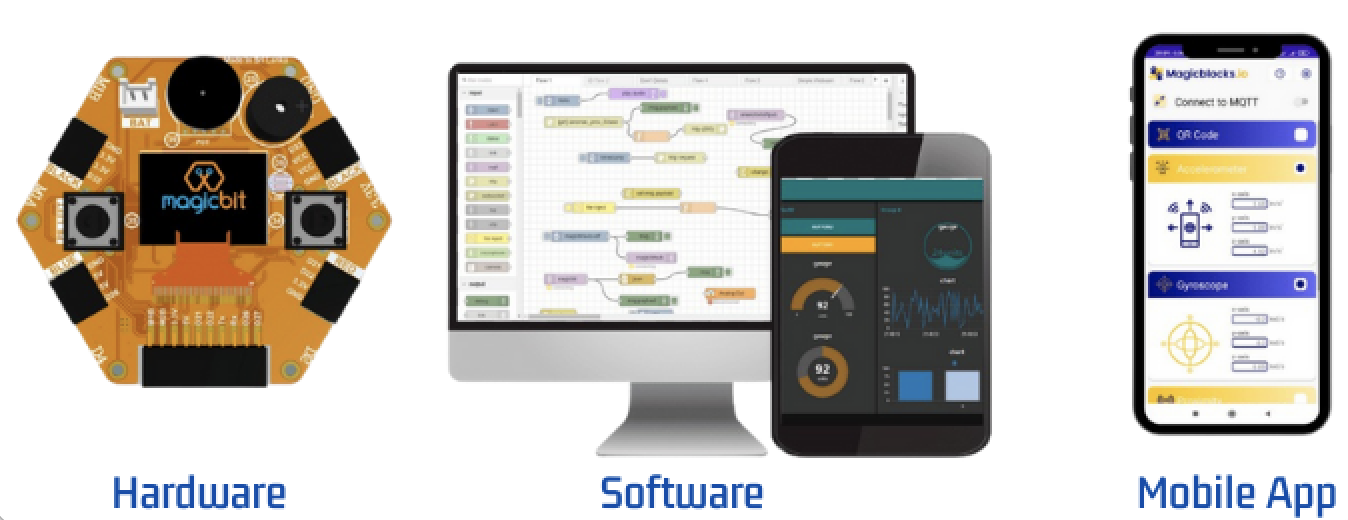- Home
- Hardware
- SDKs
- Cloud
- Solutions
- Support
- Ecosystem
- Company
- Contact
news
Magicbit: An ESP32-Driven Dev Board on Kickstarter
Reporting from Shanghai, China
Aug 27, 2021
Magicbit, a new ESP32-based and Arduino-compatible dev board, got fully funded on Kickstarter in just four hours!
Consisted of Migara Amithodana, Anuruddha Tennakoon, and Akalanka De Silva, the Magicbit team has been working on their eponymous development board and software platform for the past two years. Their work has resulted in a STEM tool, a DIY builder, a learning aid, as well as a platform for creative thinkers. As such, Magicbit packs significant potential into a small board. The Magicbit team has recently launched a relevant crowdfunding campaign on Kickstarter, which got completely funded in just four hours, thus receiving a “project we love” badge. They are now getting ready for mass production.

More specifically, Magicbit is a feature-rich hexagonal development board based on the power of ESP32. Its aim is to get you up and running with IoT projects and STEM development as quickly as possible. Magicbit is compatible with a range of programming languages including its own block-based IDE.
The heart of the hexagonal Magicbit development board is an ESP32 module, programmed over a micro-USB port. Expansion connectors are included on four of the six sides, to support pluggable wire-free modules including motion, temperature, humidity, proximity, distance, tilt, and soil moisture sensors, plus infrared emitters, servo motors, and RGB LEDs.
Magicbit also includes several built-in features, such as a color OLED display, two push-button inputs, a piezoelectric buzzer, a potentiometer, connectors and a charging circuit for a lithium-ion battery, a light-dependent resistor (LDR), and an on-board motor driver. Moreover, a large expansion board is also added to the bottom, as well as crocodile-clip connection points for breadboard-free connection to other hardware.
Magicbit is compatible with all popular platforms and programming languages. For example if you are familiar with Arduino and MicroPython, you can still use Magicbit for your projects. Furthermore, Magicbit can also be used with magicblocks.io, which is a cloud-based IoT platform with an inbuilt device manager and a visual-code builder based on Node-RED. Magicblocks attenuates the complexity of hardware, firmware and protocols, but -most importantly- it is available for free to anyone wishing to use it for learning purposes.
Finally, the Magicblocks mobile app brings the inbuilt sensors and the capabilities of the mobile phone to Magicbit’s solution-development environment. This enables getting sensor data from the phone, and using the phone as an input or output device.
According to De Silva, “Magicbit is made for everyone. Students and kids can use it as a STEM tool to familiarize with the IoT technology in a practical way. Developers and researches can use it to capture data, and prototype solutions. Hobbyists can use Magicbit, as well, to find solutions to problems they are keen on solving in today’s world”.
To get all the details about Magicbit, you can check out its crowdfunding campaign.


 LinkedIn
LinkedIn 微信
微信
 Twitter
Twitter Facebook
Facebook
